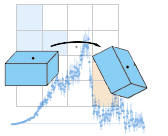
| HOME | PEOPLE | RESEARCH | ACADEMICS | TRAVEL/VISITORS | LINKS | CONTACT |

|
Web Mail
Mailing Lists
Computing Resources
Site Map
Averaging Theorems for Highly Oscillatory Differential Equations and Nonholonomic Motion Planning
Wensheng Liu, Department of Mathematics, Rutgers University
Wednesday, July 6, 199411:00 AM to 12:00 PM
Spalding 106
We study the relation between trajectories of control affine systems of the from $\Sigma: \dot{x} = \sum_{k=1}^{m}u_{k}(t)f_{k}(x)$, where $f_1,\ldots,f_m$ are smooth vector fields on a smooth manifold $M$, and those of a ``Lie bracket extension'' of ($\Sigma$), that is called an extended system, given by $\Sigma_{ext} \dot{x} = \sum_{k=1}^{r}v_{k}(t)f_{k}(x)$ where the first $m$ vector fields $f_1,\ldots,f_m$ are the same as in ($\Sigma$), and the new admissible directions of motion $f_{m+1},\ldots,f_r$ are Lie brackets of the $f_k, k\in\{1,\ldots,m\}$. Using tools from differential geometric control theory and developing proper algebraic formalisms, we first study systematically the limiting behavior of trajectories of $(\Sigma)$ generated by a sequence of inputs in $L^1([0,T],\rr^m)$. We give necessary and sufficient conditions, generalizing earlier work by Kurzweil and Jarnik, for a sequence $u^j=(u_1^j,\ldots,u_m^j)\in L^1([0,T],\rr^m)$ to be such that, for every choice of smooth vector fields $f_k,k=1,\ldots,m$, the trajectories of $\dot x = \sum_{k=1}^mu_k^j(t)f_k(x)$ converge to those of ($\Sigma_{ext}$). Using these conditions, we can then solve the {\it inverse} problem: given any trajectory $\gamma$ of ($\Sigma_{ext}$), find trajectories of ($\Sigma$) that converge to $\gamma$. This is done in a universal way that the construction only involves the knowledge of the $v_{1},\ldots,v_r$ and the structure of the Lie brackets in the extended system, but does not depend on the vector fields $f_k$. These results can be applied to approximate an arbitrary path for controllable systems without drift, which gives an alternative approach to the Motion Planning Problem for nonholonomic systems studied by many authors.
|
©2003-2011 California Institute of Technology. All Rights Reserved webmaster |
|